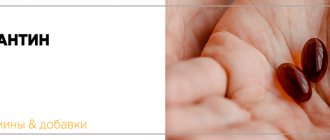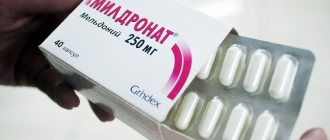Why is it needed?
As coenzyme R,
biotin acts as an enzyme assistant - it participates in the absorption of fatty acids from plant and animal fats.
Including polyunsaturated fatty acids of the Omega complex, which are very important for the health of the body. In addition, biotin is involved in the metabolism of carbohydrates in the body. It helps in the production of enzymes that break down glucose and the accumulation of energy reserves
in the muscles.
It also participates in the process of glucogenesis - the synthesis of glucose from substances that are not carbohydrates, for example, amino acids and fatty acids. Biotin contains sulfur, which is essential for healthy skin and hair. Therefore, it is often included in therapeutic and preventive cosmetics
. As a B vitamin, biotin helps the absorption of its other “classmates” - folic acid (B9), pantothenic acid (B5) and vitamin B12. It is also involved in the removal of carbon dioxide from the body, helping to transport it.
DAILY REQUIREMENT
Physiological needs for biotin according to Methodological Recommendations MP 2.3.1.2432-08 on the norms of physiological needs for energy and nutrients for various groups of the population of the Russian Federation:
- There is no upper permissible consumption level.
- The physiological requirement for adults is 50 mcg/day (introduced for the first time).
- The physiological need for children is from 10 to 50 mcg/day (introduced for the first time).
Table 1. Recommended daily intake of biotin depending on age (mg):
| Age | Daily requirement for biotin, (mcg) | |
| Children from 1 year to 11 years | 1 — 3 | 10 |
| 3 — 7 | 15 | |
| 7 — 11 | 20 | |
| Men (boys, young men) | 11 — 14 | 25 |
| 14 — 18 | 50 | |
| > 18 | 50 | |
| Women (girls, girls) | 11 — 14 | 25 |
| 14 — 18 | 50 | |
| > 18 | 50 |
Cases in which the need for vitamin B7 increases by 20–50%:
- excessive physical activity, professional sports (swimming, football, basketball, wrestling, alpine skiing, gymnastics, figure skating, hockey, cycling, mountaineering, fencing, rowing, running);
- living in a cold climate, when the air temperature drops 35 degrees below zero;
- increased carbohydrate content in the daily menu;
- constant neuropsychic stress;
- alcohol abuse;
- dangerous burns;
- for diabetes;
- the presence of gastrointestinal diseases, which are accompanied by profuse diarrhea;
- work with chemicals (carbon disulfide, arsenic, mercury);
- long-term treatment with antibiotics.
What prevents it from being absorbed?
Biotin dissolves in water, which means it is freely excreted from the body through the kidneys and is practically not stored in reserve. Therefore, it must be supplied to the body with food daily
.
The intake of biotin into the body worsens alcohol consumption - it disrupts the function of the liver, which absorbs vitamin H from food, and the work of the intestinal microflora that produces it. In addition, a lack of biotin is observed in lovers of raw eggs. Their protein contains the substance avidin
, an antivitamin of biotin. But when heated, avidin is destroyed, so boiled eggs do not interfere with the absorption of biotin. But raw egg yolk, on the contrary, is one of the best sources of biotin. Also, a lack of biotin is observed in people who are forced to take antibiotics for a long time - due to the death of beneficial intestinal microflora.
Beneficial properties of vitamin B7
Vitamin B7 is involved in the metabolism of fatty acids leucine, keratin, as well as in the formation of glucose, so the use of biotin has a positive effect on almost all processes in the body.
There are 5 areas that the vitamin affects most strongly: 1. Stabilization of metabolism.
In this case, you need to pay attention to the biological effect of biotin: it is involved in the metabolism of carbohydrates, fats and proteins. Metabolic disorders that affect the functioning of the entire body may be associated precisely with a lack of vitamin B7.
2. Healthy hair and nails.
The most common use of biotin is for hair and nails. The strengthening and healing effect is achieved by the fact that vitamin B7 promotes the synthesis of keratin, the protein that forms the basis of hair and nails.
3. Nervous system support.
For the full functioning of the brain and the entire nervous system, the body requires glucose. Its deficiency negatively affects both the psycho-emotional and physical condition of a person. To prevent this, people with diabetes or low glucose levels take vitamin B7 as it promotes gluconeogenesis, the natural production of glucose from non-carbohydrate compounds.
4. Tissue restoration.
The regeneration of any tissue in the human body, be it muscle fibers or skin, also depends on metabolism. With a biotin deficiency, simple skin injuries and muscles damaged during training or exercise will take a long time to heal.
5. Child development.
When a woman is pregnant or breastfeeding, biotin is required not only for herself, but also for her baby. Often, pregnant women develop hypovitaminosis, which leads to health problems for both mother and baby. But pregnant women should treat all supplements with extreme caution. More information about the use of biotin during pregnancy can be read in the “Contraindications and side effects” section.
Important! Biotin will not affect healthy metabolism, will not speed up hair growth in a person with normal keratin levels, and will not increase glucose production if the body has enough of it. It acts precisely in the area where a person has problems.
Who should take it?
Based on the described mechanism of action of biotin, we can list situations in which it is worth considering purchasing this supplement:
- for problems with metabolism;
- with brittle or split ends, hair loss, baldness, gray hair;
- if your nails peel or often break;
- before upcoming stressful situations, such as exams;
- during intense physical activity;
- during strict diets, when biotin intake from food is reduced.
Pregnancy, long-term use of hormonal drugs or antibiotics, as well as alcohol and smoking can lead to a decrease in the production of vitamin B7, and, consequently, its deficiency.
What is biotin for women?
The supplement is most popular among women, sometimes it is even called the “beauty vitamin.” Girls use biotin to strengthen hair and nails, as it increases the production of keratin. Vitamin B7 also affects skin health: eliminates irritation, reduces the effects of acne, dermatitis, eczema and other skin diseases.
To understand how biotin affects hair, you need to know the structure of the hair itself. Keratin cells make up more than 50% of their composition, so this protein primarily affects the health of the hair. Keratin can also be taken as a stand-alone dietary supplement, but this protein is insoluble in water, which increases the chance of overdose and side effects. Biotin is a water-soluble vitamin that promotes the natural production of keratin in the body. Excess of this drug is excreted from the body through urine or sweat and does not harm the body.
Why do athletes need biotin?
Vitamin B7 is necessary for athletes for 2 reasons:
1. Control of energy exchange and metabolism.
Muscle growth is built on a healthy metabolism, which requires adequate levels of biotin. Its deficiency will become an insurmountable barrier to gaining muscle mass, and all other biological supplements will not have the desired effect until the biotin level returns to normal.
2. Maintaining blood glucose levels.
During exercise, blood glucose levels decrease and the body begins to synthesize it, breaking down glycogen stored in the muscles and liver. But this reserve may not be enough. When glucose levels decrease, the athlete will begin to feel unwell, loss of performance, and heaviness in the muscles. Biotin, which accelerates the process of gluconeogenesis, will increase your glucose supply even during grueling workouts.
Why does the body need biotin in diabetes?
People with diabetes have higher than normal blood glucose levels, but they also have indications for biotin use. This may seem contradictory at first glance, but there is actually a logical reason why diabetics need biotin.
The main problem of diabetes is not an increase in blood sugar, but a decrease in insulin, which stimulates the processing of glucose. Biotin not only increases glucose levels in the body, but promotes gluconeogenesis - the conversion of glucose into glycogen. The action of biotin in any case leads to stabilization of glucose levels.
The most important
Biotin is a vitamin that preserves the beauty of skin and hair, and also helps maintain metabolism at a good level, participating in almost all metabolic processes.
Its absorption is disrupted by the consumption of raw egg whites, antibiotics and alcohol. And the most biotin is in whole grain bread and raw yolk. Tags:
- Appearance
- Vitamins
- Metabolism
- Leather
- Dictionary
To leave a comment you must be an authorized user
Signs of biotin deficiency in the body
Experts recommend a daily dosage of vitamin B7 in the amount of 30 mcg - this amount should be sufficient to maintain the normal functioning of the body. However, those who want to grow a rich hairstyle or a thick beard require much more biotin. You can tell that your body is not getting enough of it by the following symptoms:
- active hair loss;
- hair is too dry;
- split ends;
- loss of natural shine;
- weakening of hair color;
- peeling of the scalp.
Biotin for hair: what is this substance and how is it useful Biotin for hair: what is this substance and how is it useful
Biotin for hair: what is this substance and how is it useful Biotin for hair: what is this substance and how is it useful
In addition, it is recommended to take biotin for a number of diseases:
- psoriasis;
- dermatitis of various nature;
- seborrhea;
- dysfunction of the sebaceous glands.
A special feature of vitamin B7 is its rapid and complete absorption - in other words, the body cannot accumulate it “in reserve.” A decrease in the level of vitamin B7 in the body can be caused by a variety of reasons. These include:
- alcohol abuse;
- drinking a lot of coffee;
- inclusion of heat-treated fats in the diet;
- taking antibiotics and some other drugs;
- eating raw eggs;
- excessive use of diets;
- problems with intestinal microflora.
The presence of any of these factors is already a reason to increase the intake of vitamin B7.
Biotin is one of the B vitamins, namely B7.
Biotin is a water-soluble substance that not only improves our appearance, but also affects our overall health. Its name comes from the Greek word “biotos”, which can be translated as “life”, “feeding” or “life-giving”. And it very well reveals the very essence of this substance, because the quality of our life directly depends on it. Biotin is a coenzyme, that is, one of the B vitamins that help the body convert food into the energy we need for a full existence. Its importance cannot be overestimated, and you will now understand why.
Historical background[edit | edit code]
Source:
Clinical Pharmacology by Goodman and Gilman, Volume 4
.
Editor
: Professor A.G.
Gilman Ed.
: Practice, 2006.
In 1916, Bateman discovered that rats fed egg whites as their only source of protein developed a syndrome characterized by neuromuscular disorders, severe dermatitis, and alopecia. This syndrome did not develop if rats were fed boiled egg whites or yeast, liver, or extracts from them were added to the food. In 1936, Kegl and Tennis isolated from egg yolk a factor necessary for the growth of yeast fungi in crystalline form, which they called biotin. Biotin turned out to be the very substance that protected rats from the toxic effects of egg white (Gyorgy, 1940).
In 1942, Du Vigneault established the structural formula of biotin, and it was synthesized shortly thereafter.
At the same time, the nature of the biotin antagonist present in egg whites was actively studied. In 1940, Akin et al. It was first isolated and named avidin. Avidin is a glycoprotein that binds biotin with high affinity, thereby preventing its absorption.
Does biotin have any contraindications?
Like any chemical, vitamin B7 has some restrictions on its intake:
- It is not recommended to take biotin-containing preparations simultaneously with pantothenic acid, since both of these substances are absorbed under competing conditions;
- Pregnant women should consult their doctor before taking biotin supplements;
- It is possible that allergic reactions to individual components of complex supplements may occur - therefore, you need to carefully study the composition of each drug.
In addition, side effects may occur if these medications are taken for too long. These include deterioration of hair condition, progression of skin diseases, rise in sugar levels, skin rashes, etc. To prevent such consequences, you should take biotin against hair loss and for hair growth, strictly following the instructions.
It is impossible to say which biotin-containing drug is the best. However, it is strongly recommended to give preference to products from well-known, reputable brands that pay sufficient attention to testing their products, controlling their quality and using pure raw materials.
You also need to remember that the beneficial effect of biotin on hair and skin may not appear immediately, which is due to individual specifics and the speed of metabolic processes. However, with the correct choice and use of the drug, the effect will certainly be achieved. You can understand what exactly to expect from biotin from user reviews and “before” and “after” photos.
How to Take Biotin Supplements Properly
In order for hair vitamins with biotin to be as beneficial as possible, you should follow certain recommendations for taking them. First of all, you need to adhere to the plan and dosages indicated in the instructions. In addition, it is advisable to consult a specialist who will help you choose the right dosage. It will depend on the following factors:
- Your age;
- your health status;
- do you have any chronic diseases;
- How bad is biotin deficiency in the body?
The average daily dosage of biotin for various hair problems is:
- 1000 mcg – to maintain healthy hair in winter, as well as to restore after chemical influences (coloring, highlighting);
- 5000 mcg – for increased dryness and brittleness of hair, as well as to increase the rate of hair growth;
- 10,000 mcg – when signs of baldness appear, in the initial stages of skin diseases.
Due to the rapid absorption of biotin and the impossibility of its accumulation in the body, a slight excess of the dose in most cases does not lead to any negative consequences. Excess vitamin B7 leaves the body with waste products.
In addition, you need to remember that there is no generally accepted scientific opinion about how much biotin the body needs. Therefore, in each case it is determined individually.
Biotin for hair: what is this substance and how is it useful Biotin for hair: what is this substance and how is it useful
Biotin for hair: what is this substance and how is it useful Biotin for hair: what is this substance and how is it useful
Diagnostics
Biotinidase deficiency is diagnosed in newborns by screening. Prenatal testing may also be done using a fluid sample from the uterus.
The normal concentration of biotin in serum (blood) is between 400 and 1200 ng/L. Deficiency is technically considered a level below 200 ng/L.
Diagnosing a deficiency can be difficult because biotin levels can fluctuate daily, so blood test results are not considered an accurate marker. Another way to test for biotin deficiency, which some experts believe is more accurate, is by measuring urinary excretion of the metabolite 3-hydroxyisovaleric acid.






